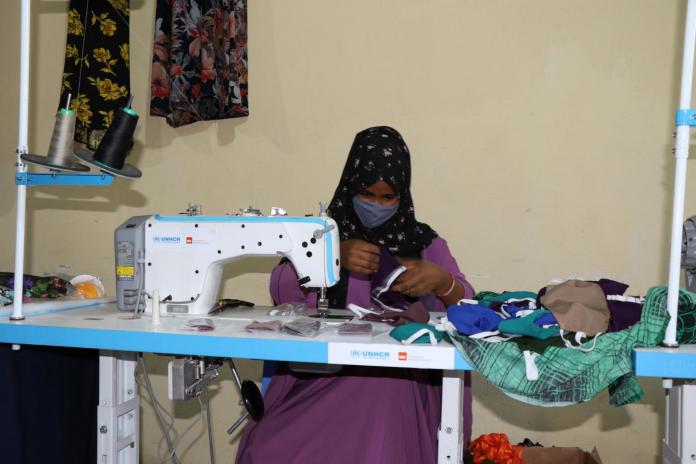Hafsa Hassan Omar, 22, lives in Hargeisa, in the Somaliland region of Somalia, with her mother, three sisters and three brothers. The family was forced to flee Ethiopia in 2001 by prolonged droughts that destroyed their livelihood. So, they moved to Somaliland in search of a better life.
From babysitter to business-owner
Hafsa used take care of her younger siblings while her mother took on casual jobs like laundry work to put food on the family table. But in 2019, Hafsa had the opportunity to join a vocational skills training programme offered by NRC. She decided to enrol on a tailoring course.
“I have always enjoyed sewing, so when this training opportunity came, I did not hesitate. The course took about eight months. After completing it, I was one of five women who received investment money and sewing machines from NRC,” she explains.
“I have now started my own tailoring shop where I make and sell clothes – and with the Covid-19 pandemic, we are now making face masks. In the future, I hope to expand my tailoring shop and even open one in the town.”
Developing employable skills
Hafsa is one of 476 young refugees in Somaliland who have benefitted from NRC’s skills training programme. Funded by the UN refugee agency (UNHCR), the programme targets young people who have previously had limited access to training and employment. It helps them to develop employable skills, enhancing their ability to seize income-generating opportunities.
Courses offered in the programme include carpentry, soap making and plastic recycling. Of the 476 young people who graduated from the programme in 2020, more than half are women.
“When people are forced to leave their homes for various reasons, including drought, their livelihoods and productivity are significantly disrupted,” explains Mohamed Nageyeh Amin, NRC’s livelihood and food security manager in Somaliland.
“This project helps displaced people in Somaliland to find decent employment opportunities through skills development, or even to start their own businesses through market linkages. This not only gives people the dignity of earning an income and being self-reliant, but also helps local institutions become more able to accommodate refugees and returnees.”
Building resilience
NRC is also implementing livelihood activities as part of the Building Resilient Communities in Somalia (BRCiS) programme. This consortium of nine international and local organisations supports communities to become more able to resist and absorb minor shocks without undermining their livelihoods.
Funded by the European Union and the World Bank, BRiCS has provided cash assistance to help families establish and sustain their businesses. The consortium has also helped set up six village savings and loans associations (VSLAs), whereby members are able to save part of their income and easily access loans.
In addition, BRiCS has supported farmers by providing knowledge on good farming skills and inputs such as drought-resistant crops that enable them improve their production and ultimately boost their income.
BRCiS balances its response to short-term humanitarian needs with longer-term assistance. It aims to build the capacity of communities and households to deal with the shocks that drive humanitarian needs in the first place.
Source: NRC































